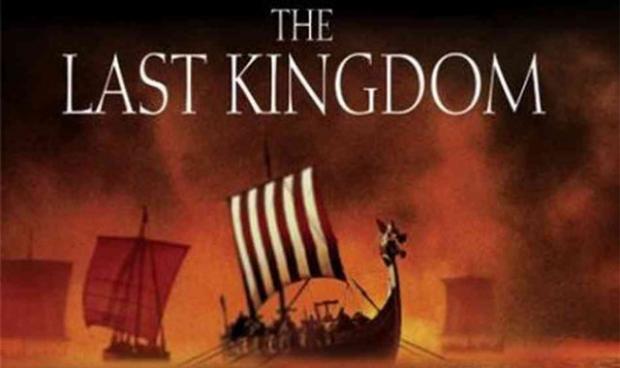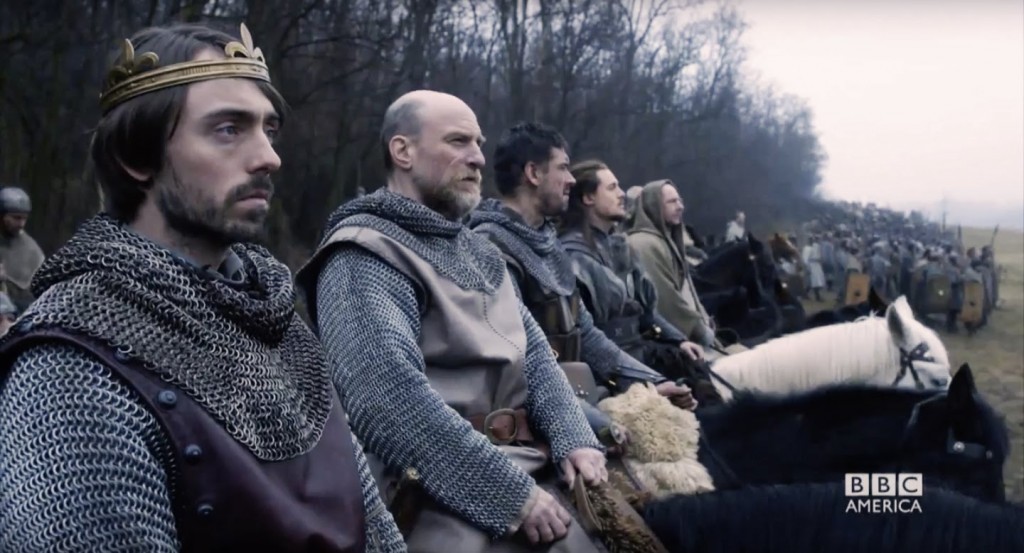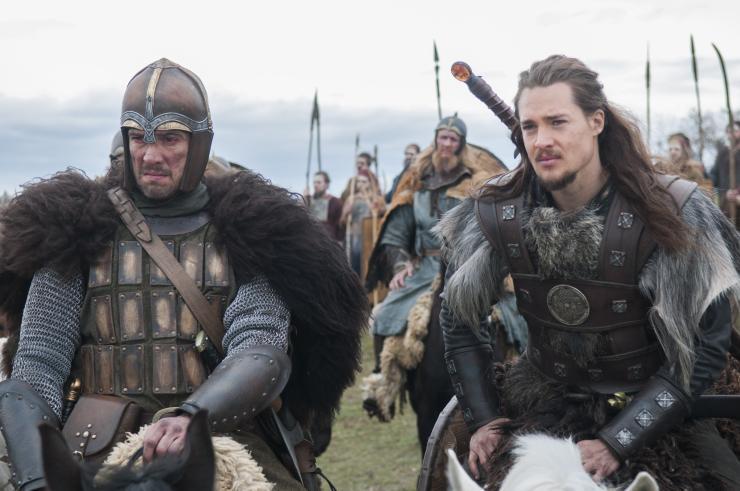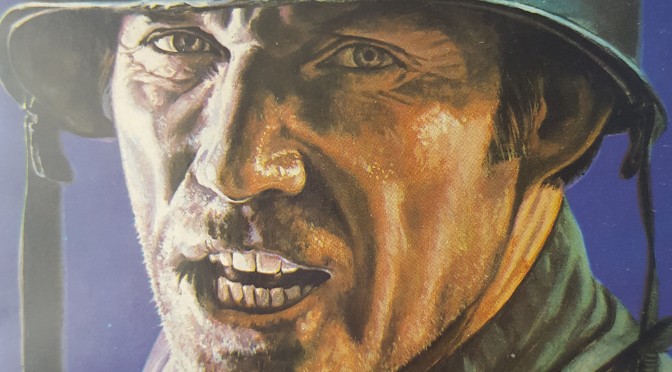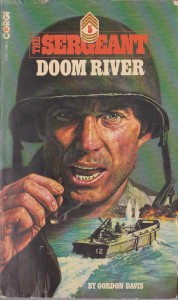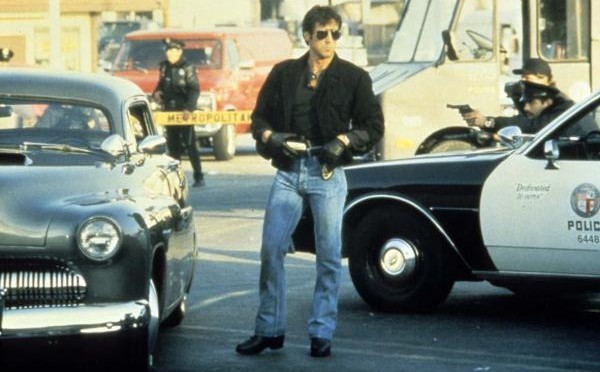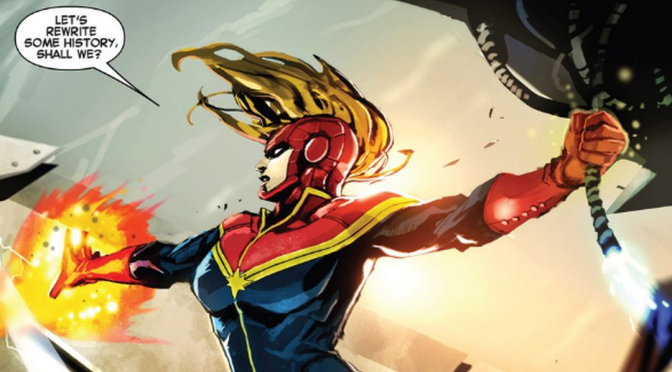I almost didn’t even give this series a chance. Hollywood and television have me so gunshy, I doubted they could produce anything that won’t nauseate me. And the BBC, from what little I know, is brimming over with cultural Marxists just like every other long-established media/entertainment organization. To trust them with anything even remotely historical? Forget it.
Then I found out it was based on Bernard Cornwell’s Saxon Tales. I’ve read some of Cornwell’s fiction (Agincourt and a few of the Sharpe novels). He’s a competent storyteller and he doesn’t butcher historical flow or details enough for me to take exception. So, “Once more into the breach,” sez I.
I guess you could say I semi-binge-watched the first two seasons on Netflix–finishing them in about a week or so.
The Premise:
In the late 9th Century, a Saxon noble and his heir are slain by a band of Danes a’viking through Bebbanburg in Northumbria. The lone surviving son was baptized and named Uhtred before being captured by the Danes.
Earl Ragnar spares the boy’s life, respecting his courage and truculence, and raises him as a Dane along with a Saxon girl named Brita. After growing into a man, and losing his adopted family (via treachery from other Danes), he becomes a vassal of Alfred, king of Wessex…”the last kingdom.” (Vikings have run roughshod over all other kingdoms in the British isles.)
Relevance:
With all the current brouhaha by the “alt-right” about race, immigration/invasion and “Magic Dirt” vs. “Magic DNA,” this series couldn’t be more timely. Genetically, Uhtred is a Saxon; yet his attitude, disposition, customs, etc. are decidedly Danish. This duality makes him an outsider in both worlds (not because everyone on both sides reject him out-of-hand, but because his ambition to rule Bebbanburg causes him to side against the invaders; while his Danish weltanshuang motivates a contemptuous disdain for the Saxons and their ways.) Though he wields completely different weapons for a completely different type of warfare, Uhtred during the Viking expeditions is not unlike Thomas Sowell during the USA’s present Cold Civil War, in that they are both slogging through similar conundrums–their demographic profile contradicting their deeply-rooted belief system.
The Religious Aspect:
Although Islam and other religions get a pass, Christianity is universally hated by the string-pullers with the monopoly on resources in the entertainment industry. It would be foolish to assume Christianity would get a fair shake in this series–especially given the behavior of the Roman Catholic Church through history. And, the historical backdrop for Last Kingdom smacks of religious conflict. The peoples of present-day Great Britain were Catholic during the period depicted, while the Northmen were still unmitigated pagans. How could you tell a story in this setting that ignored the religious aspect?
So of course the series takes cheap shots at Christianity, through the nominally Christian characters. But it is usually understated enough to ignore.
Historical Accuracy:
Alfred of Wessex and some other characters are real historical figures, while Uhtred and many others are fictional. (But is Uhtred, in fact, fictional?) Historians know a lot about Alfred because his life is very well-documented for the time. But as for the rest…well, it was the Dark Ages, folks. We are familiar with some generalities of the period…that the Vikings were raising hell in western Europe, for instance (and allegedly are the culprits who made London Bridge fall down); that the Catholic Church was growing in power; that the traditions of Roman civilization had given way to the early stages of feudalism…but there are just too many big, gaping holes in the historical record to ascertain specifics about much of what went on.
It wasn’t a question of if, but when the creative team would unleash their arsenal of ludicrous Grrrl Power tropes in the series. Surprisingly, the obligatory butt-kicking Womyn Warriors didn’t rear their preposterous heads until late in the First Season. Even more surprising: this revisionist hogwash was dialed down quickly enough to prevent me from giving up on the series. I truly am curious what caused the correction, but relieved nonetheless.
The series creators brought a technique to the screen I consider ingenious: When revealing geographic locations via subtitles, the ancient name is displayed first, then it transforms into the name it is known by today. As someone fascinated by the evolution of language, I really appreciate this gimmick.
Other Stuff:
I’m not an expert on Dark Ages melee techniques, but it seems to me when you have a shield and your enemy is swinging a sword or axe at you, you would use the shield to block or deflect the blow. Evidently, though, the shield is just an ornament, and you block a swinging sword with your own sword. Nevermind that banging two metal blades together repeatedly converts both of them to crude, dull saws–this is what BBC fight correographers have decided is the logical tactic.
It’s easy to identify the important characters on this show, because they don’t wear helmets, even in combat. I’ve remarked before about the wisdom of refusing to protect your head when weapons will be streaking toward it, so I won’t completely rehash it here.
Suffice it to say that Uhtred’s brain usually operates like somebody’s who has fought in many a melee without a helmet. Watching him navigate the ethno-political waters of 9th Century Britain is like watching the Johnson Administration navigate through the Vietnam conflict…in slow motion. For the entire first season, it’s a safe bet that in any given situation, Uhtred will choose the most idiotic course of action possible, then follow-up with a rash decision to make matters even worse. In the second season he seems to have learned a little self-discipline, thankfully, and dramatic conflict is generated in other ways.
I almost titled this post Mascara Kingdom because, for a few episodes, several of the male actors were painted with black eye shadow. It stuck out like a mosh pit at a royal ball. Seems like one character in Game of Thrones was made up that way too, if I remember correctly. Don’t know what the purpose is, but I’m glad they seem to have given up on that effort–it looked pretty stupid.
I might watch a third season of Daredevil if it comes to Netflix, but no other TV show has proven worth my time in several years. This show I plan to watch more of–and might even read the books it was based on, if that tells you anything.

